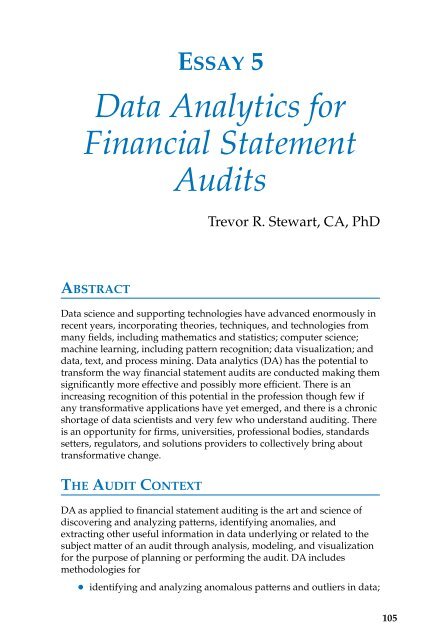AUDIT ANALYTICS AUDIT
1JWn3ix
1JWn3ix
You also want an ePaper? Increase the reach of your titles
YUMPU automatically turns print PDFs into web optimized ePapers that Google loves.
ESSAY 5<br />
Data Analytics for<br />
Financial Statement<br />
Audits<br />
Trevor R. Stewart, CA, PhD<br />
ABSTRACT<br />
Data science and supporting technologies have advanced enormously in<br />
recent years, incorporating theories, techniques, and technologies from<br />
many fields, including mathematics and statistics; computer science;<br />
machine learning, including pattern recognition; data visualization; and<br />
data, text, and process mining. Data analytics (DA) has the potential to<br />
transform the way financial statement audits are conducted making them<br />
significantly more effective and possibly more efficient. There is an<br />
increasing recognition of this potential in the profession though few if<br />
any transformative applications have yet emerged, and there is a chronic<br />
shortage of data scientists and very few who understand auditing. There<br />
is an opportunity for firms, universities, professional bodies, standards<br />
setters, regulators, and solutions providers to collectively bring about<br />
transformative change.<br />
THE <strong>AUDIT</strong> CONTEXT<br />
DA as applied to financial statement auditing is the art and science of<br />
discovering and analyzing patterns, identifying anomalies, and<br />
extracting other useful information in data underlying or related to the<br />
subject matter of an audit through analysis, modeling, and visualization<br />
for the purpose of planning or performing the audit. DA includes<br />
methodologies for<br />
identifying and analyzing anomalous patterns and outliers in data;<br />
105


